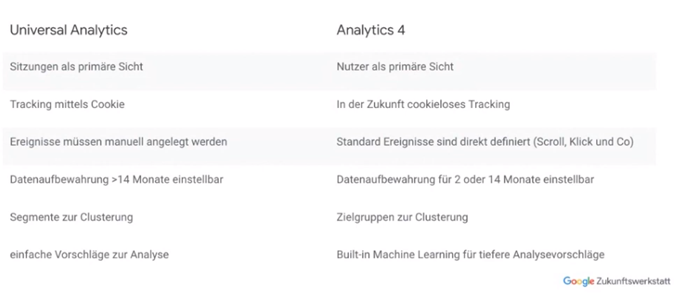For several years, the free analysis tool "Google Universal Analytics" has been known in web analytics circles. Now its end is in sight, because next year it will be replaced by "Google Analytics 4". What does this mean exactly? Where are the differences? And what are the concrete possibilities for action?
by Fabian Weidmann
Google Universal Analytics will definitely be replaced by Google Analytics 4 in 2023
As of July 1, 2023, it will no longer be possible to collect web and e-commerce data with a Universal Analytics property. Anyone who wants to continue to generate valuable information about the website and the behavior of users will have to switch to Google Analytics 4 by the end of June 2023 at the latest. This seems to be a long way off for now, but watch out! In order to continue to have reference values of the previous year for a comparison, it is necessary to carry out the change already this year. That is, as of July 1, 2022!
Of course, it is still possible to access the data collected so far in Google Universal Analytics. This will also be possible for another 6 months, i.e. until the end of 2023. In order not to lose this information, we recommend extracting the data history from Google Universal Analytics within this time window.
The main differences
The switch to Google Analytics 4 (GA4) brings with it some far-reaching changes. Therefore, we have compiled the most important in brief here:

One big difference is clearly that GA4 now focuses on users and not on individual sessions as was previously the case in Google Universal Analytics (UA). In other words, in UA, each new access to the website was measured as a single session, regardless of the channel (organic, paid, social media, etc.). With the user view in GA4, a connection is created across these different website accesses and assigned to a single user. That is, it measures how many sessions a user opens and what events, including events or conversions, this triggers. This makes it easier to track user behavior.
Another big change is that the bounce rate is no longer measured as in UA, but the engagement. In other words, the exact opposite. Instead of measuring how many users leave the page without interacting with it, we now measure how many users trigger an interaction (engagement) on the website. Engagement is defined as, among other things:
- a user who is on the website for more than 10 sec,
- at least 2 pages are called up
- or when a conversion is triggered.
The average session duration also changes. Previously, the time between calling up the first and the last page was measured here. In GA4, the value refers to the time between the first and last event. This value is thus more accurate in GA4, but is not comparable with the UA value as a result.
In GA4, there is no longer a distinction between target projects and e-commerce transactions. Both are simply events that are measured automatically or according to your own definition/configuration. With a simple click, you can then define conversions (events that contribute to the success of your business) from relevant events.
Concrete recommendation for action - Our offer
Due to these fundamental changes from Google Universal Analytics to Google Analytics 4, it is not possible to transport the existing data between the tools. In order to be able to continue to create reports with meaningful comparisons with the previous year after the definitive changeover to GA4 in 2023, it is therefore imperative to carry out the migration by July 1,2022.
This does not mean that only GA4 has to be used from July this year. For a clear overview and better understanding as well as comparability, it is recommended to operate both systems in parallel during this one-year transition phase. However, professional support is required here to ensure that the data is only compared and not double counted.
For the changeover, we are of course happy to assist and support you. So that the process for your company can be implemented as smoothly and efficiently as possible and you can get the most out of these changes.
We offer the following (time required: 1 hour):
- Set up a Google Analytics 4 property for basic tracking of your web usage data.
- Creation of a roadmap incl. offer for the setup or migration of existing conversion & e-commerce tracking
Are you interested in implementing the conversion from Google Universal Analytics to Google Analytics 4 with us? Then we look forward to hearing from you!
